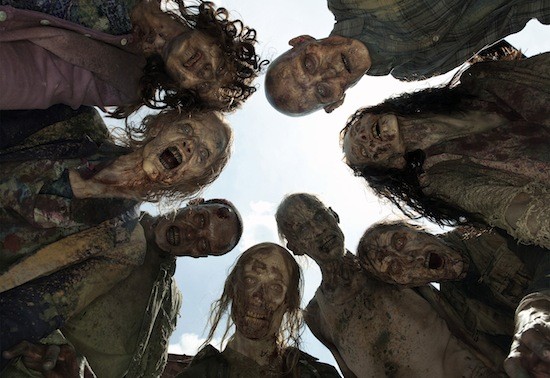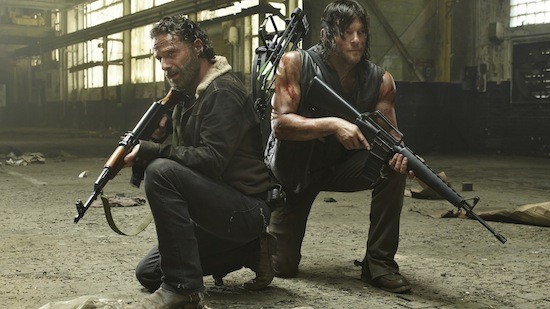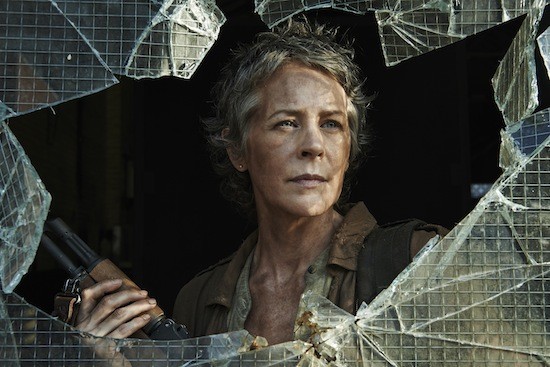The Walking Dead, one of the most popular shows on television, is about the South. To survive the zombies is to be dehumanized through repetition. The characters are always negotiating this. Life is horrible, and it wears you down. If you aim for something better, you are letting your guard down and will be consumed.
In The Wire (from which Walking Dead imports cast members) and Romero’s zombie films, it was not simply about the code of survival. It was about the social order that leads to racism—capitalism without empathy. There was an analytic, satirical lilt that brought the hope of something better. That kind of thoughtful remove only appears here when it comes to blood and guts, and silent action sequences.

Makeup artist Greg Nicotero’s zombie effects are a recurring highlight of The Walking Dead.
Instead, The Walking Dead extends its continual, hysterical horror to every waking moment in a cornpone apocalyptic South that is 90% backwoods and dirt. The first half of the fifth season, airing last fall, featured an improbable Twilight Zone hospital in Atlanta. The second half-season, ending Sunday, is better, speaking to showrunner Scott Gimple’s strength: quiet character moments. The group enters a suburban stronghold and for once are the cause of the conflict, a new twist on the small communities with secret flaws they’ve run into.
The quiet bits get better and better. A solitary character digging a hole eats a worm. A mourner cries, gets up and stabs a zombie, then goes back to crying. When the show goes for bigger ideas it fails, such as that still-functioning hospital populated by uniformed cops and nurses. The cops are rapists who create patients by hitting people with their cars, and the patients who survive get scrubs. The hospital is held in a delicate balance of power by a character named Dawn, so thinly drawn that she and her locale are unbelievable from start to finish. The same is true when characters leave for Washington, D.C. on the word of a mulleted redneck character who claims he is a scientist and has a cure. They are improbably flabbergasted when he does not.

Andrew Lincoln and Norman Remus in The Walking Dead
But the current story arc works. The characters exhibit PTSD. Group leader Rick (Andrew Lincoln) gets clean-shaven and becomes an awkward neighborhood hunk. Carol (series MVP Melissa McBride) memorably threatens a child with a literal monster story while promising him cookies. They read as veterans unable to fake their way through civilian life. And no matter how clumsily an ill-fated supply run or tenuous alliance is set up, I’m still frightened by the inevitable zombie attacks. There’s no new monsters, no head zombie, no new wrinkle in the human sadists or built to spill communities we see, only more zombies.

Melissa McBride as Carol in The Walking Dead
The Walking Dead is secretly about the state of labor in this country: the act of doing something just to get by. Instead of earning money, the action is sending a knife or bullet into a dirty head. Even when it experiments, as with Tyreese’s stream-of-consciousness death, the camera always lingers on Greg Nicotero’s compelling makeup effects, which have humor and detail the storylines lack. Heads deflate lovingly. What would a skull look like with a flare going off inside? How do branch-impaled zombies sway? Our heroes destroy faces, and this violence is what we came for: the utter denial of another’s identity to preserve our own.
In horror film criticism there is much discussion of the Other. But The Walking Dead is resolutely less and less able to investigate the zombies or tell their stories. In Frank Darabont’s first season, Rick told a poor woman who had become melded to her bike, in an arty moment of empathy, “I’m sorry this has happened to you.” Now the undead are simply flesh thrills of the week, while the dramatic emphasis is on how weary everyone is. And, as they tell you about 200 times in overwrought Southern accents, they are really fucking weary.
To be a sleepy-eyed crossbow enthusiast or a grizzled sheriff with a bizarre British-Southern cadence is to want to let your guard down, to want to stop being alert. As Rick puts it, talking about how to let go of fear: “Rest in peace, now get up and go to work.” It sums up what it is like to be in an environment where your job is a repetition that slowly beats the life from you. To be an action hero requires a romanticized view of oneself, to see the world as full of monsters and a denial of empathy for others as the only way to stay alive. This viewpoint is very appealing. But even some of the worst real-life experiences have moments of respite. The romance is that there never would be, it’s the lie that sells the hole you’re stuck in.
The Walking Dead season 5 finale airs Sunday on AMC.